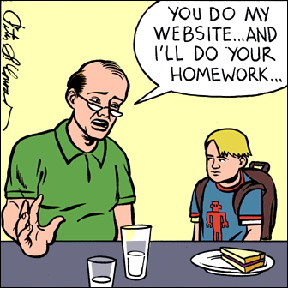Digital Immigrants? I Beg Your Pardon, Ma'am.

Recently I was at a technological staff development session, which is a fancy name for teachers being taught. In our day, teachers were sage repositories into which we inserted a coin marked with our name, grade and age and received a preformulated serving of knowledge, encapsulated in a cylindrical package. We were to drink of this can, forged of the strong steel of tradition, stamped with dates and vitamins and things that were surely good for us. Some of us drank this draught deeply and wanted more, some played with the can so it got dented, some spilled it entirely, and if you did, you were out of luck. It was your fault you flunked, even if you were allergic to the contents of the can, even if it was spoiled, even if you couldn’t bear the taste.
Nowadays, teaching isn’t about what the teacher is presenting, but about what the students learn. It doesn’t matter if your lesson is phenomenal, if no one you’re teaching understands it. Instead of a processed beverage of knowledge, today’s teacher must know the specific nutritional needs of each of her students, and prepare a meal that will be appealing and nourishing for each and every consumer of her wisdom. This weaves in new threads of motivation, choice and interest levels.
In an effort to address these, a few other teachers and I were taking a class on how to introduce technology more effectively. Our instructor told us that the students in our classrooms were “digital natives,” having been born into a world that had always had the benefit of highly technological devices, and because they were proficient, usually before entering formal schooling, with the use of computers, technological toys, and even cellphones. We teacher learners under her tutelage, however, were deemed “digital immigrants.” My geek cred responded with indignance. Au contraire. I had a Commodore 64, which I programmed in BASIC, by the time I was 15. Sure, this programming primarily repeated the name of my favorite band in an infinite stream, or made asterisk snowflakes stream down, but it was something. These “digital natives” not only were not in the womb, but some of their parents were not even yet gestated at that time.
Feh. Ask a nine-year-old what a BBS is. They’ve got no idea. They never played “Forbidden Forest” as run off of a tape drive. They don’t know what the screech of a dialup modem sounds like, and they have no concept of pay-by-the-hour internet. If you asked them to pick “computer beige” from a color chart, they’d be without even a pixel of a clue.
So I don’t think that I qualify as a digital immigrant. First generation, maybe. But not even that. That’s Bill Gates, Steve Jobs, Steve Case. We built upon our forebears’ foundations, forging the technological frontier of now: Google, Yahoo, Facebook, Twitter, MySpace, and the blogosphere. It is up to us, the digital Gen-Xers, the second generation, to bridge the natives and the immigrants. We can translate, able to relate to both ways of life, that of the Old World (before tech), and the new (where life without tech is unthinkable).

Comments